You probably think this will be just another boring Home Page...
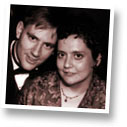 ...with pictures of me, my husband , our cats , hobbies, etc. About as exciting as Spam(tm). Well, you're not
far wrong. I mean, what can a person blather on about that random
net-surfers could care less about? ...with pictures of me, my husband , our cats , hobbies, etc. About as exciting as Spam(tm). Well, you're not
far wrong. I mean, what can a person blather on about that random
net-surfers could care less about?
There's my family, I suppose. None of them have Home Pages yet,
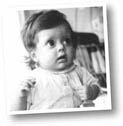 so you'll have to take my word for their existence. My father,
Morris Wolfe , is a teacher and writer. My mother, Carla McKague , is a lawyer and former mathematician. My sister Jen is a musician and mother of two, and my brother Ben does desktop publishing and has three kids. We're all Mac users,
which prevents arguments on the merits of different systems. so you'll have to take my word for their existence. My father,
Morris Wolfe , is a teacher and writer. My mother, Carla McKague , is a lawyer and former mathematician. My sister Jen is a musician and mother of two, and my brother Ben does desktop publishing and has three kids. We're all Mac users,
which prevents arguments on the merits of different systems.
Do you want to know my early history? I was born in Hamilton,
Ontario on September 14, 1964. I was nauseatingly cute as a small
child, and looked like those paintings of children 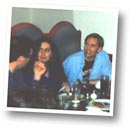 with enormous eyes. We moved around a lot, and I went to a number
of different schools. We settled in Toronto when I was ten. From
age six to about eighteen, theatre was my main interest. I took
drama classes, got involved in amateur theatre, and worked part
time at Young People's Theatre. Then in high school , my interest shifted to history and re-enactment . with enormous eyes. We moved around a lot, and I went to a number
of different schools. We settled in Toronto when I was ten. From
age six to about eighteen, theatre was my main interest. I took
drama classes, got involved in amateur theatre, and worked part
time at Young People's Theatre. Then in high school , my interest shifted to history and re-enactment .
I could talk about university
(like puberty, thankfully over). I spent almost as much of my life there
(ten years more or less) as I've spent asleep. Come to think of it...
As a student, I wrote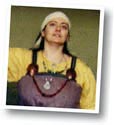 countless papers, culminating in a 100-page thesis on experimental archaeology
which no-one, including myself, is ever likely to read again.
countless papers, culminating in a 100-page thesis on experimental archaeology
which no-one, including myself, is ever likely to read again.
I graduated in 1995 with a shiny new master's degree shortly after
relocating to England. Still, England was full of fascinating history, mild weather (compared to Canada ), and Englishmen with sexy accents. I'd had a lot of friends
in the UK for years, partly through archaeological and museum
work in 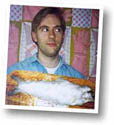 Canterbury and York , partly through involvement in Viking reenactment , but mainly from the Usenet newsgroup uk.singles , which I discovered by chance while I was a grad student. Meeting
some of these folks face to face has been amusing, educational,
and in at least one case has led to major changes in my life. Canterbury and York , partly through involvement in Viking reenactment , but mainly from the Usenet newsgroup uk.singles , which I discovered by chance while I was a grad student. Meeting
some of these folks face to face has been amusing, educational,
and in at least one case has led to major changes in my life.
I moved to the UK in June of 1995 to finish my thesis and cohabit
with Pete Bevin, aka the Moose. While I was there, I did some
busking with my lap harp and then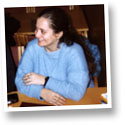 found a great job in London doing restoration of antiquities.
We worked mainly on archaeological pieces intended for resale
by antiquities dealers, which is a bit of a shady field, but was
really interesting. I worked mainly on a pair of Etruscan sarcophagi
I nicknamed Charles and Di because the sculptural figures looked
like them. Here 's a similar piece from the Louvre with two figures on top, so
you'll know what I'm talking about. found a great job in London doing restoration of antiquities.
We worked mainly on archaeological pieces intended for resale
by antiquities dealers, which is a bit of a shady field, but was
really interesting. I worked mainly on a pair of Etruscan sarcophagi
I nicknamed Charles and Di because the sculptural figures looked
like them. Here 's a similar piece from the Louvre with two figures on top, so
you'll know what I'm talking about.
 Life over
there was pretty good, and I had no plans to return to Canada soon.
I'd still be there if I hadn't been diagnosed with inflammatory
breast cancer in April of 1996. My initial treatment, mainly at
the renowned Women's
College Hospital in Toronto, included six months of high dose chemotherapy
(EC with GCSF), a modified radical mastectomy
, five weeks of daily radiation
treatments and ongoing hormonal therapy with tamoxifen
. I lost all my hair (as you can see ), but it came
back in time for my wedding
in October 1997. Life over
there was pretty good, and I had no plans to return to Canada soon.
I'd still be there if I hadn't been diagnosed with inflammatory
breast cancer in April of 1996. My initial treatment, mainly at
the renowned Women's
College Hospital in Toronto, included six months of high dose chemotherapy
(EC with GCSF), a modified radical mastectomy
, five weeks of daily radiation
treatments and ongoing hormonal therapy with tamoxifen
. I lost all my hair (as you can see ), but it came
back in time for my wedding
in October 1997.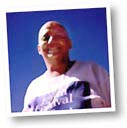
The prognosis for IBC isn't usually very good. I had a recurrence
to the brain in September, discovered just 10 days before the
wedding. Most IBC patients eventually have the disease spread,
but usually to the skin, bones, liver or lung. Brain tumours are
difficult to treat (bad), but as the sole site of disease still
allow the possibility of cure (good). Surgery is normally done
only if there are just one or two tumours in safe 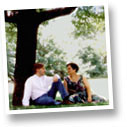 locations, there is no other disease, and the patient is healthy.
Without surgery, the odds of making our first anniversary weren't
good, but there were a lot of tests before we'd know if it was
operable.We weren't able to find out until after the honeymoon. locations, there is no other disease, and the patient is healthy.
Without surgery, the odds of making our first anniversary weren't
good, but there were a lot of tests before we'd know if it was
operable.We weren't able to find out until after the honeymoon.
The wedding went ahead at the Elmwood, formerly a private women's
club, which has a wonderful atmosphere and helpful staff. The
bride wore garnet and gold, the fecund matron of honour wore hunter
green, and the menfolk wore double breasted tuxedos with garnet
and hunter waistcoats. The minister who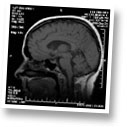 married us is an old friend of mine, a tiny Scotswoman with flaming
tresses. We had 85 guests for a sit-down dinner. The honeymoon
was at Sandals Ocho Rios, in Jamaica. I was on high doses of steroids
and we were under a lot of stress, but we still managed to have
a great time. We went snorkeling, horseback riding in the ocean,
climbed Dunn's River Falls, and spent a lot of time relaxing in
or next to the resort's three pools. married us is an old friend of mine, a tiny Scotswoman with flaming
tresses. We had 85 guests for a sit-down dinner. The honeymoon
was at Sandals Ocho Rios, in Jamaica. I was on high doses of steroids
and we were under a lot of stress, but we still managed to have
a great time. We went snorkeling, horseback riding in the ocean,
climbed Dunn's River Falls, and spent a lot of time relaxing in
or next to the resort's three pools.
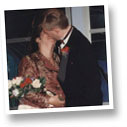 I was very lucky and the tumour was solitary and operable. Surgery
(performed while I was awake) was October 27, with radiation about
a month later. It took a few months to regain my energy, more
for my hair to come back a second time, and I was left with some
residual clumsiness of the right hand, but overall I felt well
again six months after rediagnosis. I was able to work part time
doing web graphics, I joined a dragon boat team for breast I was very lucky and the tumour was solitary and operable. Surgery
(performed while I was awake) was October 27, with radiation about
a month later. It took a few months to regain my energy, more
for my hair to come back a second time, and I was left with some
residual clumsiness of the right hand, but overall I felt well
again six months after rediagnosis. I was able to work part time
doing web graphics, I joined a dragon boat team for breast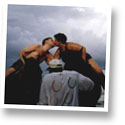 cancer survivors, and by the summer of 1998, I started to dare
to hope and make plans again. After all, I was told that 80% of
operable metastatic brain tumours don't come back. cancer survivors, and by the summer of 1998, I started to dare
to hope and make plans again. After all, I was told that 80% of
operable metastatic brain tumours don't come back.
We were feeling pretty good about things, and came into some unexpected
money, enough for a down payment on a house. We found a place
fairly quickly that was pretty luxurious for two, with an open
concept main floor, a jacuzzi in the bathroom, separate studies
and a cathedral ceiling in the bedroom. It's near downtown in
a really 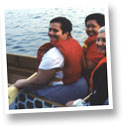 friendly neighbourhood full of film people and kids. I had high
hopes for the garden despite my total lack of experience, but
so far have only managed to keep it from going completely wild
with the help of friends. Unfortunately my holiday from treatment
ended just days after we moved in. friendly neighbourhood full of film people and kids. I had high
hopes for the garden despite my total lack of experience, but
so far have only managed to keep it from going completely wild
with the help of friends. Unfortunately my holiday from treatment
ended just days after we moved in.
The tumour recurred in exactly the same place in September 1998.
The surgeon wasn't encouraging about more surgery given the risk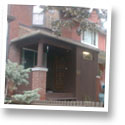 of disability, so I opted for Stereotactic Radiosurgery, a focused
radiation blast to the tumour. 95% of the time, it controls tumour
growth for at least a year or two, but after just a few months,
the size on the MRI was increasing again. A second awake craniotomy
was done in January 1999, removing all visible tumour and leaving
me with a slight limp. Six weeks later, an MRI showed what appeared
to be regrowth, which was confirmed by increased size on the next
MRI and a sudden worsening of symptoms in late May. of disability, so I opted for Stereotactic Radiosurgery, a focused
radiation blast to the tumour. 95% of the time, it controls tumour
growth for at least a year or two, but after just a few months,
the size on the MRI was increasing again. A second awake craniotomy
was done in January 1999, removing all visible tumour and leaving
me with a slight limp. Six weeks later, an MRI showed what appeared
to be regrowth, which was confirmed by increased size on the next
MRI and a sudden worsening of symptoms in late May.
Two operations had failed, and radiation had failed twice, so
we were left with chemotherapy, often ineffective in the brain.
June and July I took high-dose methotrexate, an intensive in-patient
protocol, but 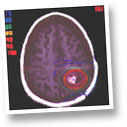 the tumour doubled in size. August and September I retried the
high-dose EC that had worked in 1996. I knew I'd lose my hair
(the 4th time) on chemo, but this time Pete decided to shave his
head too. We had a party and required that everyone either shave
their head or pay ten dollars, and we donated the money to cancer
research. The tumour didn't respond the tumour doubled in size. August and September I retried the
high-dose EC that had worked in 1996. I knew I'd lose my hair
(the 4th time) on chemo, but this time Pete decided to shave his
head too. We had a party and required that everyone either shave
their head or pay ten dollars, and we donated the money to cancer
research. The tumour didn't respond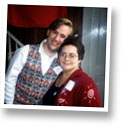
October 1999 I started Temodal, an experimental drug that hasn't
been tested yet on breast cancer (even in the brain, it's still
breast cancer). Two months later, another MRI. I was still feeling
reasonably well, although incredibly tired. Comments my surgeon
had made had left me with the idea that some of the mass might
be dead tissue, and I asked for an experimental test that can
distinguish tumour from necrosis, in the hope that things might
not be as bad as they seemed. The day after the tests, I was told
that the mass seemed to be smaller, which was the first good news
in almost a year. Better 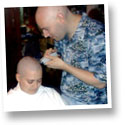 news followed a week later, when the other test indicated that
there was no living tumour detectable, that it was all necrosis.
An expert in radiosurgery reviewed all of my 1999 MRIs, and said
it was possibly necrosis all year, a textbook case of post-treatment
damage. news followed a week later, when the other test indicated that
there was no living tumour detectable, that it was all necrosis.
An expert in radiosurgery reviewed all of my 1999 MRIs, and said
it was possibly necrosis all year, a textbook case of post-treatment
damage.
It was days before Christmas and Y2K celebrations, and I had gone
from believing the tumour was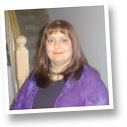 resistant to everything and I was going to die, to finding I
was free of disease. Even my normally cautious oncologist was
talking about the possibility of cure. It was a hard shift to
make, even though the news was so good. I had almost lost hope,
and had to relearn to dream. There were a lot of sleepless nights
as my mind made the adjustment. The physical disabilities are
still there. I have limited use of my right hand, a pronounced
limp, and I can only walk a few blocks. I don't know how much
will come back -- I want to play the harp again, to work with
glass and metal, to race in the dragon boat, ride a bike. If I
stay well, I'll resistant to everything and I was going to die, to finding I
was free of disease. Even my normally cautious oncologist was
talking about the possibility of cure. It was a hard shift to
make, even though the news was so good. I had almost lost hope,
and had to relearn to dream. There were a lot of sleepless nights
as my mind made the adjustment. The physical disabilities are
still there. I have limited use of my right hand, a pronounced
limp, and I can only walk a few blocks. I don't know how much
will come back -- I want to play the harp again, to work with
glass and metal, to race in the dragon boat, ride a bike. If I
stay well, I'll 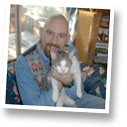 have the time to relearn some of those things. have the time to relearn some of those things.
I'm not able to work right now, and I miss it. I want to feel
productive again. I have a pretty unusual collection of skills
and experience in my CV, but without good dexterity, most of them are impossible. I learned
to read Braille for fun when I was young, I taught myself the
harp in my twenties, picked up some silversmithing, copper enamelling,
calligraphy and art restoration, and while I've been sick I've
developed computer skills, run a mailing list with Pete, and improved
my computer graphics skills.
Menya Wolfe, wolf@bestiary.com , October 27, 1999
|
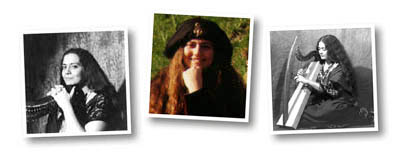
 ...with pictures of me, my
...with pictures of me, my  so you'll have to take my word for their existence. My father,
so you'll have to take my word for their existence. My father,
 with enormous eyes. We moved around a lot, and I went to a number
of different schools. We settled in Toronto when I was ten. From
age six to about eighteen, theatre was my main interest. I took
drama classes, got involved in amateur theatre, and worked part
time at Young People's Theatre. Then in
with enormous eyes. We moved around a lot, and I went to a number
of different schools. We settled in Toronto when I was ten. From
age six to about eighteen, theatre was my main interest. I took
drama classes, got involved in amateur theatre, and worked part
time at Young People's Theatre. Then in  countless papers, culminating in a 100-page thesis on experimental archaeology
which no-one, including myself, is ever likely to read again.
countless papers, culminating in a 100-page thesis on experimental archaeology
which no-one, including myself, is ever likely to read again.
 found a great job in London doing restoration of antiquities.
We worked mainly on archaeological pieces intended for resale
by antiquities dealers, which is a bit of a shady field, but was
really interesting. I worked mainly on a pair of Etruscan sarcophagi
I nicknamed Charles and Di because the sculptural figures looked
like them.
found a great job in London doing restoration of antiquities.
We worked mainly on archaeological pieces intended for resale
by antiquities dealers, which is a bit of a shady field, but was
really interesting. I worked mainly on a pair of Etruscan sarcophagi
I nicknamed Charles and Di because the sculptural figures looked
like them.  Life over
there was pretty good, and I had no plans to return to Canada soon.
I'd still be there if I hadn't been diagnosed with
Life over
there was pretty good, and I had no plans to return to Canada soon.
I'd still be there if I hadn't been diagnosed with 
 locations, there is no other disease, and the patient is healthy.
Without surgery, the odds of making our first anniversary weren't
good, but there were a lot of tests before we'd know if it was
operable.We weren't able to find out until after the honeymoon.
locations, there is no other disease, and the patient is healthy.
Without surgery, the odds of making our first anniversary weren't
good, but there were a lot of tests before we'd know if it was
operable.We weren't able to find out until after the honeymoon. married us is an old friend of mine, a tiny Scotswoman with flaming
tresses. We had 85 guests for a sit-down dinner. The honeymoon
was at Sandals Ocho Rios, in Jamaica. I was on high doses of steroids
and we were under a lot of stress, but we still managed to have
a great time. We went snorkeling, horseback riding in the ocean,
climbed Dunn's River Falls, and spent a lot of time relaxing in
or next to the resort's three pools.
married us is an old friend of mine, a tiny Scotswoman with flaming
tresses. We had 85 guests for a sit-down dinner. The honeymoon
was at Sandals Ocho Rios, in Jamaica. I was on high doses of steroids
and we were under a lot of stress, but we still managed to have
a great time. We went snorkeling, horseback riding in the ocean,
climbed Dunn's River Falls, and spent a lot of time relaxing in
or next to the resort's three pools. I was very lucky and the tumour was solitary and operable. Surgery
(performed while I was awake) was October 27, with radiation about
a month later. It took a few months to regain my energy, more
for my hair to come back a second time, and I was left with some
residual clumsiness of the right hand, but overall I felt well
again six months after rediagnosis. I was able to work part time
doing web graphics, I joined a dragon boat team for breast
I was very lucky and the tumour was solitary and operable. Surgery
(performed while I was awake) was October 27, with radiation about
a month later. It took a few months to regain my energy, more
for my hair to come back a second time, and I was left with some
residual clumsiness of the right hand, but overall I felt well
again six months after rediagnosis. I was able to work part time
doing web graphics, I joined a dragon boat team for breast cancer survivors, and by the summer of 1998, I started to dare
to hope and make plans again. After all, I was told that 80% of
operable metastatic brain tumours don't come back.
cancer survivors, and by the summer of 1998, I started to dare
to hope and make plans again. After all, I was told that 80% of
operable metastatic brain tumours don't come back. friendly neighbourhood full of film people and kids. I had high
hopes for the garden despite my total lack of experience, but
so far have only managed to keep it from going completely wild
with the help of friends. Unfortunately my holiday from treatment
ended just days after we moved in.
friendly neighbourhood full of film people and kids. I had high
hopes for the garden despite my total lack of experience, but
so far have only managed to keep it from going completely wild
with the help of friends. Unfortunately my holiday from treatment
ended just days after we moved in. of disability, so I opted for Stereotactic Radiosurgery, a focused
radiation blast to the tumour. 95% of the time, it controls tumour
growth for at least a year or two, but after just a few months,
the size on the MRI was increasing again. A second awake craniotomy
was done in January 1999, removing all visible tumour and leaving
me with a slight limp. Six weeks later, an MRI showed what appeared
to be regrowth, which was confirmed by increased size on the next
MRI and a sudden worsening of symptoms in late May.
of disability, so I opted for Stereotactic Radiosurgery, a focused
radiation blast to the tumour. 95% of the time, it controls tumour
growth for at least a year or two, but after just a few months,
the size on the MRI was increasing again. A second awake craniotomy
was done in January 1999, removing all visible tumour and leaving
me with a slight limp. Six weeks later, an MRI showed what appeared
to be regrowth, which was confirmed by increased size on the next
MRI and a sudden worsening of symptoms in late May. the tumour doubled in size. August and September I retried the
high-dose EC that had worked in 1996. I knew I'd lose my hair
(the 4th time) on chemo, but this time Pete decided to shave his
head too. We had a party and required that everyone either shave
their head or pay ten dollars, and we donated the money to cancer
research. The tumour didn't respond
the tumour doubled in size. August and September I retried the
high-dose EC that had worked in 1996. I knew I'd lose my hair
(the 4th time) on chemo, but this time Pete decided to shave his
head too. We had a party and required that everyone either shave
their head or pay ten dollars, and we donated the money to cancer
research. The tumour didn't respond
 news followed a week later, when the other test indicated that
there was no living tumour detectable, that it was all necrosis.
An expert in radiosurgery reviewed all of my 1999 MRIs, and said
it was possibly necrosis all year, a textbook case of post-treatment
damage.
news followed a week later, when the other test indicated that
there was no living tumour detectable, that it was all necrosis.
An expert in radiosurgery reviewed all of my 1999 MRIs, and said
it was possibly necrosis all year, a textbook case of post-treatment
damage. resistant to everything and I was going to die, to finding I
was free of disease. Even my normally cautious oncologist was
talking about the possibility of cure. It was a hard shift to
make, even though the news was so good. I had almost lost hope,
and had to relearn to dream. There were a lot of sleepless nights
as my mind made the adjustment. The physical disabilities are
still there. I have limited use of my right hand, a pronounced
limp, and I can only walk a few blocks. I don't know how much
will come back -- I want to play the harp again, to work with
glass and metal, to race in the dragon boat, ride a bike. If I
stay well, I'll
resistant to everything and I was going to die, to finding I
was free of disease. Even my normally cautious oncologist was
talking about the possibility of cure. It was a hard shift to
make, even though the news was so good. I had almost lost hope,
and had to relearn to dream. There were a lot of sleepless nights
as my mind made the adjustment. The physical disabilities are
still there. I have limited use of my right hand, a pronounced
limp, and I can only walk a few blocks. I don't know how much
will come back -- I want to play the harp again, to work with
glass and metal, to race in the dragon boat, ride a bike. If I
stay well, I'll  have the time to relearn some of those things.
have the time to relearn some of those things.